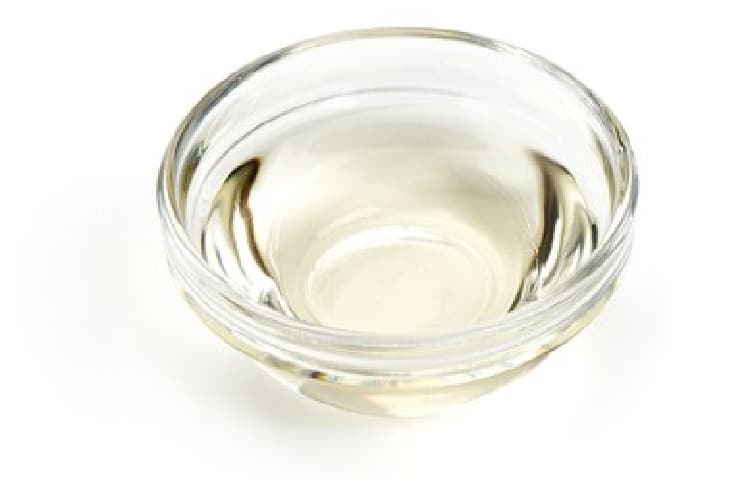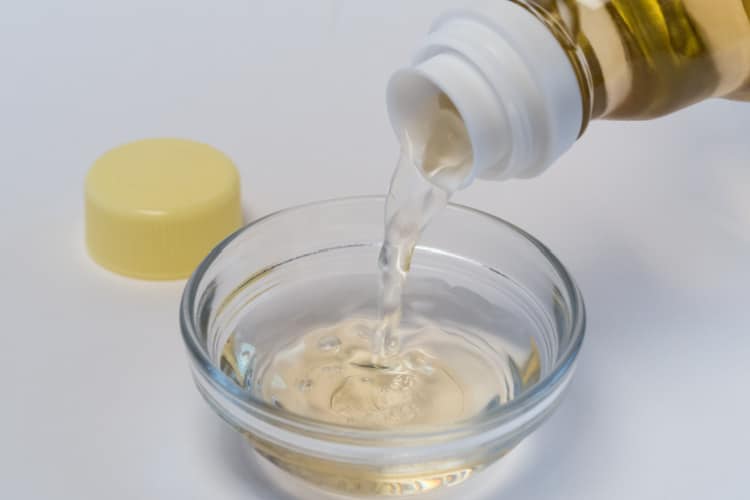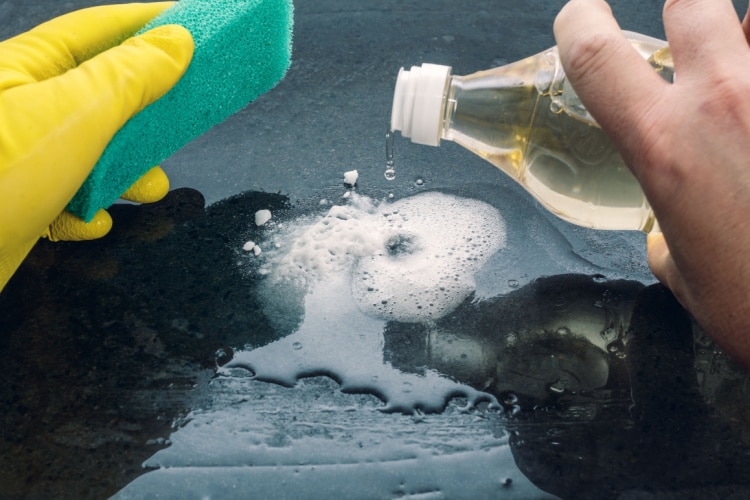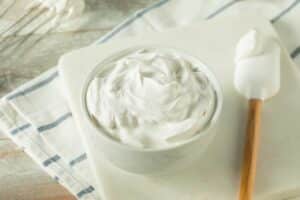Although there is just one word that separates these two delicious condiments, they’re very different, from the alcohol base used to make each variety of vinegar to its general flavor. So, let’s explore what makes them so unique.
Difference Between White Vinegar and White Wine Vinegar
The main difference between white vinegar and white wine vinegar is the ingredients for the fermentation process.
White vinegar, also known as distilled vinegar, is made by fermenting grain alcohol into acetic acid. White wine vinegar is created by fermenting white wine into acetic acid.

Vinegar fermentation is a process in which a huge number of tiny microbes consume and break down alcohol (ethanol), distilling it with water and producing the acidic liquid we know as vinegar.
Anything alcohol, from wine and apple cider to beer, can be made into vinegar. The alcohol of choice for white vinegar is grain alcohol. The tiny microbes’ job is to break it down to 5-10% acetic acid and dilute it into 90-95% water.

The microbes in white wine, on the other hand, need to bring down the ethanol to a pleasant acidity of between 5-7% with 93-95% water.
Let’s now examine what the variations in fermentation bring to the table.
Are White Vinegar & White Wine Vinegar Really White?
Both condiments are translucent, not white. White vinegar is as transparent as water. White wine vinegar usually resembles regular white vinegar, but it may also have a golden, hazy transparency.
What Do They Taste Like?
White vinegar has a very sharp flavor with a sour taste, so it’s crucial to be careful while cooking with it. White wine vinegar is sour but also somewhat sweet and fruity. Compared to white vinegar, it has a milder, more subtle flavor.
Which Vinegar’s Aroma Is Sharper?
If you can’t differentiate these two types of vinegar by their color or flavor, you will undoubtedly be able to identify them by their scents. White vinegar has a robust, sour aroma, more pungent than white wine vinegar. On the other hand, white wine vinegar has a mildly acidic and fruity scent.
How Are They Used in Cooking?
White vinegar works great in marinades, especially when paired with sweet sauces that balance the intense acidity, like BBQ sauce.
It’s also the preferred component when fermenting pickles or other vegetables. To ferment pickles, all you need to do is put the veggies with herbs and seasonings to soak in white vinegar and let them sit for a few days!
On the other hand, white wine vinegar is a common ingredient in chicken adobo, salsa verde, or chili dips. Traditional vinaigrette dressing, hollandaise, and bearnaise sauce all use white wine vinegar as their primary component.
In addition to enlivening sauces and dressings, it’s a type of vinegar you can spray over salads, and it tastes great on top of potatoes and cucumbers. Due to its mild sweetness and acidity, it’s also great for braising meat.
White wine vinegar is a good option for pickling veggies, but unlike white vinegar, which is used for pickles, white wine vinegar is the go-to choice for pickling red onion.
White Vinegar vs. White Wine Vinegar Comparison Table
| Category | White Vinegar | White Wine Vinegar |
| Fermentation Ingredients | Grain alcohol | White wine |
| Acetic Acid | 5-10% | 5-7% |
| Color | Transparent | Transparent or hazy-golden |
| Taste | Very sour | Sour, sweet, and fruity |
| Aroma | Strong sourness | Mildly acidic and fruity |
| Usage | Marinades, BBQ sauce, salsa, chili, chicken adobo, fermenting pickles. | Fermenting red onions, brightening potato salad or cucumber salad, braising meat, vinaigrette dressing, hollandaise, and bearnaise sauce. |
Nutritional Content Breakdown: Which One Is Healthier?
White vinegar and white wine vinegar have the same nutritional profiles, which means they are equally healthy for you to consume! Just remember, vinegar is consumed in small amounts, so one tablespoon is plenty and still allows you to get its health benefits.
Here are some health benefits associated with consuming white vinegar and white wine vinegar:
- Both slow down digestion, making you feel satisfied sooner and thus allowing you to consume fewer calories;
- White wine vinegar contains polyphenols, powerful natural antioxidants;
- Both assist in reducing cholesterol;
- Both control blood sugar and insulin levels, which making them great for the heart;
- Warts, fungus, and ear infections can all be avoided thanks to the antimicrobial properties of white vinegar;
- An itchy scalp might be relieved with white vinegar;
White Vinegar vs. White Wine Vinegar: Nutritional Profile
| Category (1 tbsp) | White Vinegar | White Wine Vinegar |
| Calories | 2.7 | 2.7 |
| Carbs | 0g | 0g |
| Fat | 0g | 0g |
| Trans fat | 0g | 0g |
| Polyunsaturated fat | 0g | 0g |
| Monounsaturated fat | 0g | 0g |
| Cholesterol | 0mg | 0mg |
| Sodium | 0.3mg | 0.3mg |
| Potassium | 0.3mg | 0.3mg |
| Protein | 0g | 0g |
| Fiber | 0g | 0g |
| Sugar | 0g | 0g |
| Vitamins & Minerals | ||
| Calcium | 0.1% | 0.1% |
| Iron | 0% | 0% |
| Vitamin A | 0% | 0% |
| Vitamin C | 0% | 0% |
Can I Substitute White Vinegar for White Wine Vinegar and Vice Versa?
Yes, you can, but you need to be careful when switching white vinegar for white wine vinegar. The other way around is completely fine. White wine vinegar can be used instead of white vinegar at a 1:1 ratio. White wine vinegar will still provide the acidity of white vinegar, but the overall flavor will be softer and a little sweeter.
However, it’s more difficult to switch out white vinegar for white wine vinegar. White vinegar has a sharp flavor and fragrance that can drastically alter the flavor of your dish. So, it’s best to start with a modest quantity and then add some sugar to lessen the acidity.
If you don’t want to experiment, you can switch white wine vinegar with another variety like apple cider, rice, sherry, red wine vinegar, or just a squeeze of fresh lemon juice.
Can White Vinegar and White Wine Vinegar Be Used for Cleaning Surfaces?

Both white vinegar and white wine vinegar are frequently used for household chores such as cleaning and washing!
White vinegar is a more effective cleaning agent because it’s more acidic. Its high acidity can dissolve many types of nasty buildup. It can remove soapy residue, brines, and sticker glue.
Mirrors and windows are both easily cleaned with vinegar. Use a newspaper to clean instead of a paper towel to prevent stains! Additionally, it may make wood paneling, cabinets, and no-wax floors shine.
Vinegar is also used to remove difficult spots and stains. You can remove wine stains, grass stains, or even body odor with a vinegar and baking soda combo. In addition, vinegar could help get rid of dog or cat feces from rugs or other materials.
Conclusion
Even though the names of these condiments are very similar, it’s now clear that they’re very different.
All varieties of vinegar go through a similar fermentation process, but what differentiates them is the alcohols that are employed. White wine is manufactured from white wine, whereas white vinegar is made from grain alcohol.
If you find it difficult to distinguish between the two, simply smell them — white vinegar will likely have a stronger kick on the nose.
As for the palate, white wine vinegar is more sweet and fruity, which is why it’s most commonly used for cooking. When it comes to cleaning, white vinegar’s strong acidity makes it the preferable choice.
Regardless of which style you prefer, keeping a bottle of both in your cabinet is typically the best move you can make. Both are quite nutritious, yet one is excellent for cooking, and the other is perfect for cleaning.







